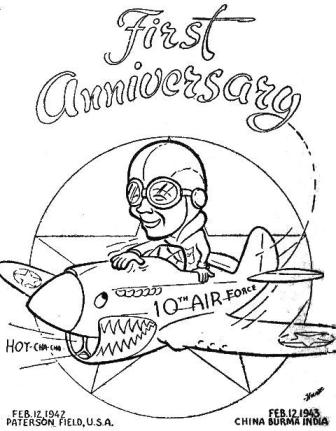
VOL. I NO. 23 REG. NO. L5015 DELHI, THURSDAY FEBRUARY 18, 1943.
AIR FORCE OBSERVES BIRTHDAY
Brig. Gen. William D. Old, Tenth Air Force Chief of Staff, now wears the most famous pair of general's stars in the U.S. Army Air Forces, as a result of the recent Senate action confirming him for the new rank. The stars were pinned on Old by Brig. Gen. Clayton Bissell, commanding general of the Tenth Air Force. They are the same stars that Mrs. Bissell sent to her husband in Chungking last year and they were pinned on Bissell's shoulders by Brig. Gen. John Magruder, head of the first American Military Mission to China of this war, at a ceremony on the roof of Gen. Stilwell's house in Chungking. When Jimmy Doolittle passed through Chungking after the Tokyo raids last April, he received notification of his promotion to brigadier general and Bissell pinned them on Doolittle. Leaving Chungking, Doolittle stopped at a base in China, where Brig. Gen. Claire Chennault had just received word of his promotion so Doolittle put them on Chennault because they were again the only pair of stars around. Last fall, Caleb V. Haynes, now commander of the India Air Task Force, was made a brigadier general while serving as bomber chief for Chennault. Again they were the only stars on hand and so Chennault pinned them on Haynes. Realizing their sentimental value, Haynes returned them to Bissell, who once again pinned them on a new brigadier general when Robert C. Oliver, head of the Theater's Air Service Command was promoted. Oliver returned them to Bissell. When Old gets his own insignia, they will again be returned to Bissell. |
ANNIVERSARY CELEBRATED BY
RAIDING JAPANESE IN BURMA
The Tenth Air Force appropriately celebrated its first anniversary Feb. 12, by inflicting extensive damage on Japanese installations and aircraft in Burma.
As bombers were streaking toward their targets, the anniversary was being observed at all Air Corps points throughout the theater.
In addition to missions against the enemy, the various schedules included: a general assembly of each unit, at which the commanding officer addressed his command, embodying a brief history of the Tenth Air Force, including respects to officers and men who have distinguished themselves and those who have given their lives in the service. At most points special efforts were made for a gala mess, plus such special entertainment as could be improvised.
Attacks on Burma were not confined solely to the anniversary day. Here are the week's activities:
Mingaladon, principal Japanese air base in the Rangoon area, was attacked by our bombers on Feb. 9. All bombs fell in the target area, causing various fires. Hits were reported on the runways.
A delayed report of an attack by our bombers against railroad rolling stock at Maymyo Feb. 10, states that hits were secured on the target and damage caused.
During the anniversary day operations, nearly 20 tons of bombs were delivered on and near Myitgne Bridge, which had previously been made a critical repair problem for the Japs. Direct hits were scored by large caliber bombs, blasting at least one span and doing additional damage.
Two formations of bombers dropped more than 20 tons of bombs on the railroad yards at Rangoon. Direct hits were reported on rail equipment and installations. One large fire was visible 50 miles from the target.
Enemy planes intercepted one formation and followed our bombers far out over the Bay of Bengal. One Japanese fighter was shot to pieces in midair, a second was set on fire and was reported losing altitude so swiftly it could not have reached land, a third fighter was damaged.
Tenth Air Force fighters, armed with light and fragmentation bombs, on Feb. 13, made a heavy attack on Japanese installations in Lonkin, northern Burma. Many direct hits were reported on buildings utilized by the enemy as headquarters and for the storage of supplies. Reconnaissance the following day confirmed that 10 of 12 enemy barracks across the river had been destroyed by fire, and smoke from other fires in Lonkin was still rising.
On the same day, two formations of our bombers attacked concentrations of railroad cars in central Burma. At Wetlet, fires were started among enemy-occupied buildings, and it was estimated that 60 freight cars were destroyed or damaged. At Paukkan, hits were reported on a string of 80 freight cars.
On Feb. 14, an even large formation of fighters, again carrying light and fragmentation bombs, attacked an advanced enemy headquarters at Maingkwan. Barracks were completely destroyed and fires were left burning in the town.
All aircraft returned safely from the week's operations.
Camp Kohler Named In Memory Of Officer Killed In China
Honoring the first American soldier to give his life in the China-Burma-India Theater, a dedication ceremony recently signified the opening of Camp Kohler, situated 12 miles north of Sacramento, Calif.
First Lt. Frederick Kohler, a native of California, came out from the States with the Lt. Gen. Joseph Stilwell mission before the reverses in Burma and was killed in an airplane crash in China.
Leading the small list of civilians who attended the dedicatory ceremony were Mr. and Mrs. Henry H. Kohler, of Oakland, Calif., parents of the late Signal Corps officer.
Highlighting the ceremonies was the visit of Maj. Gen. Dawson Olmstead, Chief Signal Officer. After an informal review, the general delivered a vigorous address. Camp Kohler is the Signal Corps third Replacement Center.
At a luncheon prior to the ceremonies, Mrs. Kohler was the guest of Mrs. S. H. Sherrill, wife of the Commanding General. The actual dedication of the post took place in the Recreation Hall following the review. Here Brig. Gen. Sherrill presented Mrs. Kohler with a bouquet of California roses.
Following the presentation, Gen. Sherrill said, "Mr. and Mrs. Kohler, the parents of the gallant Lt. Kohler, who gave his life for his country in far-off China, have honored us with their presence. It is my privilege, Mrs. Kohler, to present to you this bouquet of California roses as a token of our esteem for you as a representative of the women of America whose courage and spirit of sacrifice is not surpassed in any other nation. We pledge that your sacrifice and that of your son shall not have been in vain, that this world - through our victory - shall be a better place in which to live." MORE
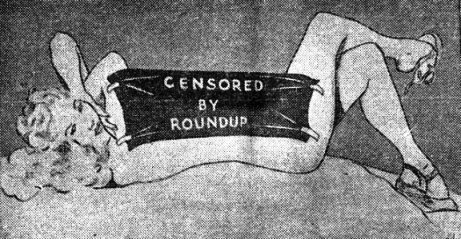
|
Official War Department mail has never competed with such pieces of humor as "Tortilla Flats" for reader interest but apparently Washington's swivel-chair corps has decided to add a little spice to the correspondence!
Last week a five-pound package of official U.S. Army documents, registered by courier service, arrived addressed to the commanding general, CBI. It was marked:
"Essential mail - exempt from censor!"
When the adjutant opened the package he found cryptographic material and turned it over to Col. Samuel S. Lamb, Signal Officer, and his cryptographic officer, Maj. J. J. Martan.
Neatly folded amid the documents was a lush pen and ink nude, couchant, and gazing provocatively at the startled officers.
Said Col. Lamb: "If this be new TBA equipment, request two, each!"
ARRANGEMENTS COMPLETED FOR UNITED PRESS SERVICE
Coincident with this issue the Roundup brings you the United Press!
One of America's two great wire services, the press association will bring to Roundup readers a welcome addition to news coverage on the home front.
UP service will augment copy already being received and has been purchased primarily to give our readers a more balanced picture of what goes on at home. This newspaper has believed from the start in news that mixed the sour with the sweet. The editor have felt that American soldiers overseas were entitled to know about shortcomings at home as well as being indoctrinated with all that is best from a land we have learned to love and appreciate a great deal more since being abroad.
The UP, being an objective commercial agency, catering to editorial policies of hundreds of subscribers, will bring us good and bad news in proper perspective. If this paper has any particular policy, other than that of entertainment, it is to give an honest cross-section of United States news.
It is not, however, our intention to sit back and carp at the throes of a great Democratic nation going through the inevitable growing pains of total war. We do not intend to highlight errors of omission and commission, but we do intend to give our short-comings, as reported by the United Press, their proper place in the day's news.
The American civilian has been reared on such journalistic grist and has always been able to read, ponder, sometimes shake his head in rueful disgust, but inevitably go forward with the thought that, though clowns might occupy the center of the stage for the moment, the fundamental drama was good, sound and virtue
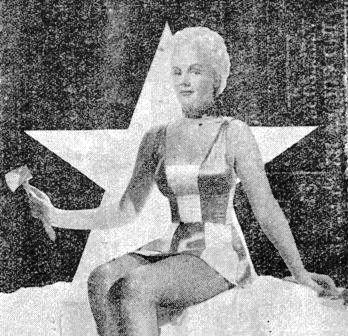
|
Even though these civilians may now be soldiers there is no evidence to indicate any change in their fundamental attitude.
United Press editors in New York have been instructed to furnish the Roundup with a good cross-section of American spot news, less news on the war effort, fighting on our scattered battlefronts, sports and Hollywood chit-chat. All of these latter are being handled ably at the present time.
Efforts are being made presently to get Acme Newspictures service air mailed to the Roundup in addition to official War Department picture releases. We are moving slowly and are still "at the end of the line," but we hope to eventually give you the best balanced service paper in this business. The philosophy of "nothing is too good for our boys" is basic with the Roundup staff.
Actually it has not been too difficult to maintain a policy wherein controversy and argument are permitted their normal journalistic place even though we are a service paper. This paper from its birth has benefited from the personal interest of the Theater Commander who has sat back and let the editors operate without wraps much to their delight and to the consequent benefit of the sheet, we think. General Stilwell's attitude on telling the truth and the whole truth within the limits of military security are too well-known to need repetition here.
We hope you feel with us that our little rag will be improved by the addition of the United Press, one of the great news agencies of the world.
THESE AMERICANS
By J. B. PRIESTLEY (reprinted from Journal of the Air Forces, India Command Edition)
The people of the United States and we British speak more or less the same language. This is a great bond between us, but it also leads to certain difficulties and misunderstandings. We are all tempted to assume that because we speak the same language, therefore the Americans have the same background of mental habits, prejudices, enthusiasms, ideas and share exactly the same outlook. This is not so. Americans are not a queer kind of English people. They are Americans, a different kind of people.
We British live in a small crowded island, where our fore-fathers have lived for hundreds and hundreds of years. We have inherited a great many traditions (many of them bad) and they influence our conduct and outlook. We are the products of a very elaborate social system, long overdue for reform. Many of our chief characteristics - our love of privacy, our respect for individuality, our dislike of loud bragging talk, our shyness and reserve - can easily be accounted for on the basis of these traditions and this social system.
Everything in the United States is different. It is not a small crowded island but an enormous and still thinly populated continent. Its climates tends to extremes, and Nature there, instead of being mild and friendly, is often raw and hostile, producing droughts, blizzards, floods, tornadoes. The result of this is that American people, outside the large cities, still tend to see other folk as their pioneering grandfathers did, that is, as fellow human beings battling against vast hostile natural forces. They see them, as Americans say, "as folks." They show an immediate warm curious interest in them. They get on easy terms at once.
Then again, the United States came into being as the result of a revolution, and the social revolutionary spirit has been kept alive because the original manifesto, embodied in the document of the American Constitution, is known to its citizens. Thus they are still keenly conscious of their social democracy and take a pride in the absence of the class distinction so common in Europe. Class consciousness tends to make people wary and reserved, to encourage them to "keep themselves to themselves," and the absence of it in America and the presence of strong democratic tradition both make the American people behave with an easy freedom not often found here in Britain.
Together, this democratic tradition and the influence of the old pioneering spirit, with its rough comradeship, have created an American pattern of behavior that is different from ours, although in essential decency, kindness, friendliness, both peoples are much the same. Unless this is realized there can be misunderstandings. An American can easily mistake English reserve for conceit, whereas it is probably shyness. An Englishman can mistake the full-blooded, half humorous pronouncements of an American for empty bragging. Such mistakes are made because there has been no allowance made for the different tradition and background. The Englishman is being judged as an American and the American as an Englishman. And that is all wrong.
Broadly speaking, American men tend to be jovial and loudly humorous in public and serious in private, whereas we British tend to be more serious in public and jovial and humorous in private. For example, in Britain it is unlikely that 500 hardworking professional men would meet once a week in order to entertain
|
The American have as much sense of personal dignity as we have, and on formal occasions they show a more elaborate courtesy than we do. But they like men to drop their dignity easily, to answer quick-pointed questions frankly, to be ready to exchange wisecracks, and they are apt to mistake the bewilderment or embarrassment of the average Englishman and to imagine it to be a complacent feeling of superiority, a sign of an unfriendly and undemocratic outlook. It is up to us to put that right.
The United States airmen have come a long way to fight alongside us. They bring with them a different tradition and outlook. They may be using the same words that we use but often they are using them with a different meaning. They and we both dislike the same things and may almost be said now to want the same things but we do not yet always laugh at the same things. And until we do a little patience and quiet understanding are needed on both sides. So let us make sure that we do not fail in contributing that little patience and understanding. It is the least we can do while the world still waits to be saved.
THEATER GIVEN 20 AIR MEDALS
Announcement has been made of award of 20 more Air Medals to officers and enlisted men of this theater, increasing the list to 68 within the past two weeks.
The list of latest awards, presented to 16 officers and four enlisted men is as follows:
Col. Cecil E. Combs, Lt. Col. Herbert Morgan, Jr., Maj. Earl R. Tash, Maj. Frank D. Sharp, Maj. Willard A. Fountain, Maj. Dalene E. Bailey, Capt. Everett W. Holstrom, Capt. Horace E. Crouch, Capt. Clayton J. Campbell, Capt. John C. Ruse, Capt. Allen P. Forsyth, 1st Lt. Emory M. Downs, 1st Lt. Albert G. Biggs, 1st Lt. Stephen C. Dennis, 1st Lt. George A. Stout, 1st Lt. Joseph F. Dockwiller, S/Sgt. Douglas V. Radney, S/Sgt. Robert T. Schafer, S/Sgt. Roland Palagi, and Sgt. William R. LaPlant.
AS THEY MAPPED WOE FOR AXIS
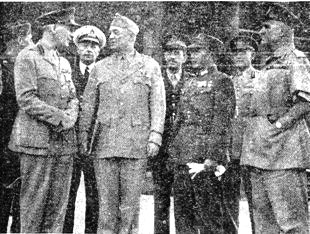 Here's an informal shot as Allied leaders conferred in India. Left to right: Brig. Gen. B. G. Ferris,
Field Marshal Sir John Dill, a British naval officer, Lt. Gen. H. H. Arnold, Maj. Gen. R. A. Wheeler, Gen. Ho
Ying Chen, Field Marshal Wavell.
Here's an informal shot as Allied leaders conferred in India. Left to right: Brig. Gen. B. G. Ferris,
Field Marshal Sir John Dill, a British naval officer, Lt. Gen. H. H. Arnold, Maj. Gen. R. A. Wheeler, Gen. Ho
Ying Chen, Field Marshal Wavell.
|
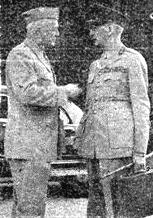 Gen. Arnold, Chief of United States Army Air Forces, uses gestures to emphasize a point to Field Marshal Dill,
who is a member of the Allied staff in Washington.
Gen. Arnold, Chief of United States Army Air Forces, uses gestures to emphasize a point to Field Marshal Dill,
who is a member of the Allied staff in Washington.
|
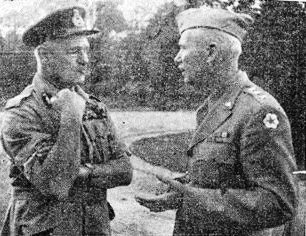 Caught in an earnest discussion, Field Marshal Sir Archibald Wavell, Commander-In-Chief, India, flexes his
arm as he chats with Lt. Gen. Brehon Somervell, chief of the entire U.S. Army Services of Supply.
Caught in an earnest discussion, Field Marshal Sir Archibald Wavell, Commander-In-Chief, India, flexes his
arm as he chats with Lt. Gen. Brehon Somervell, chief of the entire U.S. Army Services of Supply.
|
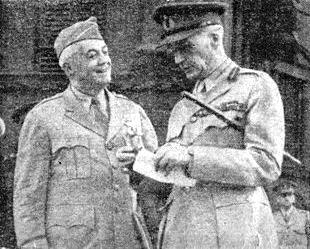 There was plenty of opportunity for private confabs. Here Gen. Arnold flashes a smile as he listens to
Field Marshal Dill. Arnold was president Roosevelt's official representative; Dill spoke for Prime
Minister Churchill.
There was plenty of opportunity for private confabs. Here Gen. Arnold flashes a smile as he listens to
Field Marshal Dill. Arnold was president Roosevelt's official representative; Dill spoke for Prime
Minister Churchill.
|
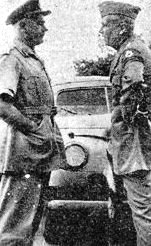 Another two-man conference takes place as Field Marshal Wavell and Gen. Somervell are caught in informal
poses.
Another two-man conference takes place as Field Marshal Wavell and Gen. Somervell are caught in informal
poses.
|
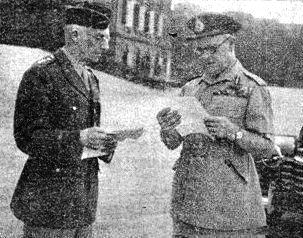 Leaving their colleagues for a moment, Lt. Gen. Joseph W. Stilwell and Field Marshal Wavel, take time out to
make a hasty comparison of notes on a phase of the important discussions that followed the meetings in Chungking.
Leaving their colleagues for a moment, Lt. Gen. Joseph W. Stilwell and Field Marshal Wavel, take time out to
make a hasty comparison of notes on a phase of the important discussions that followed the meetings in Chungking.
|
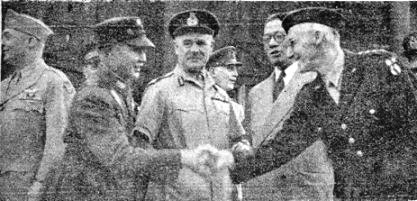 Gen. Chen, Secretary of War and Chief of Staff of Chinese Army Forces, exchanges greetings with Gen. Stilwell,
who, in addition to being U.S. commander for this theater, is also Chief of Staff for Generalissimo Chiang
Kai-shek. Watching are Field Marshal Wavell and T. V. Soong, a member of the Pacific War Council in
Washington.
Gen. Chen, Secretary of War and Chief of Staff of Chinese Army Forces, exchanges greetings with Gen. Stilwell,
who, in addition to being U.S. commander for this theater, is also Chief of Staff for Generalissimo Chiang
Kai-shek. Watching are Field Marshal Wavell and T. V. Soong, a member of the Pacific War Council in
Washington.
|
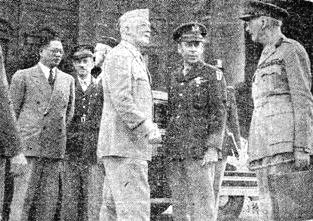 More discussions that will later become big headaches for the Japs. In the foreground is Gen. Arnold,
Brig. Gen. Clayton Bissell, Tenth Air Force Chief and Field Marshal Dill. Behind them T. V. Soong, Gen.
Wheeler, and Gen. Stilwell.
More discussions that will later become big headaches for the Japs. In the foreground is Gen. Arnold,
Brig. Gen. Clayton Bissell, Tenth Air Force Chief and Field Marshal Dill. Behind them T. V. Soong, Gen.
Wheeler, and Gen. Stilwell.
|
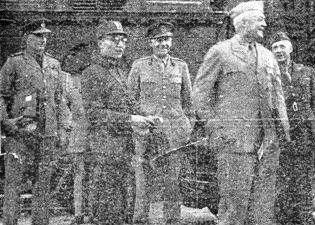 The lighter side of a serious and important meeting. Gen. Arnold relieves the tension with a humorous
remark, proving that generals maintain their sense of humor even when shaping world destiny.
The lighter side of a serious and important meeting. Gen. Arnold relieves the tension with a humorous
remark, proving that generals maintain their sense of humor even when shaping world destiny.
|
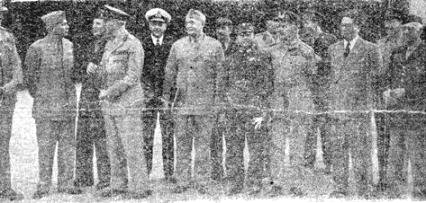 The group of conferees closes in again, more conscious of the camera, as they prepare to break up the
conference. The cameraman let us down on this shot - he didn't give us a caption. Anyway you've got a better
idea of how generals look when they get together to figure out future trends of the war in this part of the
world.
The group of conferees closes in again, more conscious of the camera, as they prepare to break up the
conference. The cameraman let us down on this shot - he didn't give us a caption. Anyway you've got a better
idea of how generals look when they get together to figure out future trends of the war in this part of the
world.
|
|
Extolling the Infantry's glory; They loved to enlarge or a Cavalry charge And make it the theme of their story. The boys in the tanks are beginning to rank And the caissons keep rolling along While pilot and plane will always attain Full credit in story and song. The news-hounds adore the parachute corps; The medics come in for their praise; But there's one bastard crew, a forgotten few, On which glory's light doesn't blaze. They spend their dull hours in forecasting showers And judging the height of the clouds, But their anticipation of precipitation Effects no cheers from the crowds. The problems climatic are not so romantic As shooting down Japs from the blue. But you bet your last dollar the fliers would holler If the weatherman failed to come through! When the Bomber Command has a mission all planned, And are set to raise hell with the Japs, There's a question of whether all's well with the weather En route to that spot on the map. That's the weatherman's call to get on the ball, And get all the dope for the flight; He can't play the breaks, or slow for mistakes No guessing - He's got to be right! When there's nothing to clear he will sit on his rear He's lazy, that point is conceded; He'll loaf on the job, and he'll jawbone an ob. * And he ain't worth a damn - 'till he's needed. - Corp. DON H. FIELDS * Weather forecast |

INNOCENT BYSTANDER And by their course his course has reckoned; When cataloging this and that Puts warring first, mere woman second. But when he goes to nip a Nippon, This above all things else id true - He means it - TERRIBLY - when he says: "So long, Babe. I'll be seein' you." - Lt. ELIZABETH SHAUNTY Of divers thoughts unpleasant to pursue After we had promised we'd allow No distance to extinguish love's red hue. I've been faithful (not through choice I know). Long, sleepless nights when memories would roll On embers flaming crimson from love's glow. Venturing throughout my very soul. Enough of me - but, you - have you been true? Your pen says "Yes," and I should have no fear Of such - but then I recollect we two United - when your husband wasn't near. - Corp. SID LICHTMAN |
|
MADAME CHIANG INVITED TO ADDRESS CONGRESS WASHINGTON - In a statement disclosing that Madame Chiang Kai-shek will soon visit Washington, Senator Tom Connally, Chairman of the Senate Foreign Relations Committee, said, "It is my hope and pleasure that she may be able to address the Congress or the Senate. At the first opportunity I shall extend an invitation on behalf of the Senate." The House voted unanimously of Feb. 10 to recess to receive Madame Chiang, who is in a New York City hospital undergoing treatment. She is reported to be making favorable progress. She has received a number of visitors recently, including Mrs. Roosevelt. |
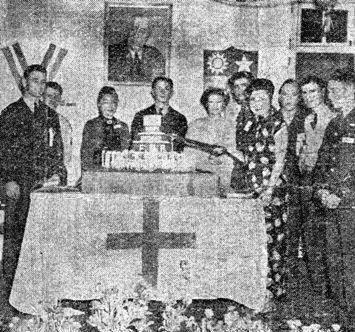 U.S. soldiers, stationed at a base in China, took time out to celebrate on the recent occasion of President
Roosevelt's birthday. Here a scene during the cake-cutting ceremony.
U.S. soldiers, stationed at a base in China, took time out to celebrate on the recent occasion of President
Roosevelt's birthday. Here a scene during the cake-cutting ceremony.
|
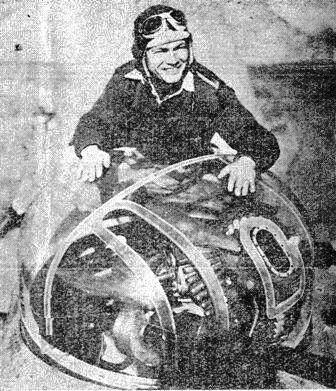 Smiling from behind the turret of a China Air Task Force bomber is T/Sgt. Douglas Radney, whose record of one
confirmed enemy plane destroyed and three probables qualified him for membership in the China Skeet and Gun
Club. Radney was a member of the Tokyo bombers last year and had already earned himself the Distinguished
Flying Cross, the Silver Star with a star and the Air Medal.
Smiling from behind the turret of a China Air Task Force bomber is T/Sgt. Douglas Radney, whose record of one
confirmed enemy plane destroyed and three probables qualified him for membership in the China Skeet and Gun
Club. Radney was a member of the Tokyo bombers last year and had already earned himself the Distinguished
Flying Cross, the Silver Star with a star and the Air Medal.
|
|
This week the Tenth Air Force celebrated its first birthday, which caused us to look over their record. It's a good record and that's why we want to call it to your attention.
This air force wasn't born in the Orient, but came into existence at Patterson Field, O., Feb. 12, 1942. In that first year, it earned the reputation as one of the fightingest and most effective air forces on any of the world's scattered battlefronts.
Men of the basic organization sailed from the States almost a year ago and they've since been joined by fellows who have had previous experience in how to fight the Jap in the sky. Some came from the Philippines, Java, Australia and other Pacific points - they're the men who had to undergo all of those painful experiences of the early days of the Pacific war. Veterans of the Tokyo raid of last April are still fighting the Jap with the Tenth Air Force. When the famous American Volunteer Group finished its service, some of the men switched over to the Army to carry on where the AVG left off.
There were those people who said that the Army couldn't fill the shoes of the AVG. The Tenth Air Force accomplished that in stride and more - they got bombing planes to China and India to begin giving the Jap some of his own stuff.
As you go through the record, two facts rise above the others; first, that the Tenth Air Force combat record, plane for plane and man for man, is as good, if not better, than the record of any other air force; second, that they have met and overcome transportation and communication odds surpassing those of any other theater.
Let's look first at the combat record from the point of official statistics: In the first year, our combat losses total 23 aircraft. Our confirmed victories in the air total at least 165, or an average of seven enemy planes destroyed for each of our aircraft lost. Many of the destroyed enemy planes were bombers, yet our losses in that category in combat number only three. The majority of our combat losses, twenty, were fighters, and several of the pilots were saved. The Jap cried enough after a trio of raids in Assam, where our fighters and anti-aircraft shot down 15. Bomber operations are another justified matter of pride. Raids against enemy objectives in Bangkok, Thailand, represent the greatest distance flown from base to target by any bomber formation thus far in the war, in any theater at any time. For mission flown against seaports, we believe we stand incomparable for the shipping losses inflicted on the enemy.
Look at the obstacles that had to be overcome in operating the "toughest airline in the world:" the extremes of climate, from the burning plains of India over the snow-capped peaks of the Himalayas and the impenetrable winter of the Chinese mountains.
The C.B.I. Roundup is a weekly newspaper published by and for the men of the United States Army Forces in China, Burma, and India, from news and pictures supplied by staff members, soldier correspondents, Office of War Information and other sources. The Roundup is published Thursday of each week and is printed by The Statesman in New Delhi, India. Editorial matter should be sent directly to Major Fred Eldridge, Rear Echelon Hq., U.S.A.F. C.B.I., New Delhi, and should arrive not later than Monday in order to make that week's issue. Pictures must arrive by Sunday and must be negatives or enlargements. Stories should contain full name and organization of sender.

FEBRUARY 18, 1943
Adapted from the original issue of CBI Roundup
Copyright © 2009 Carl Warren Weidenburner
TOP OF PAGE PRINT THIS PAGE ABOUT THIS PAGE SEND COMMENTS
PREVIOUS ISSUE CLOSE THIS WINDOW NEXT ISSUE
|
who was killed in China on March 14, 1942. First American to give his life in CBI. |
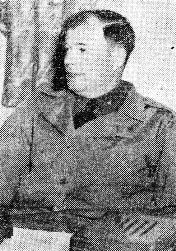
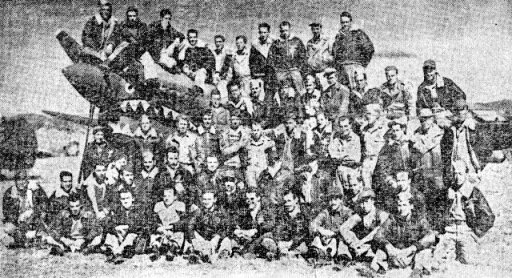 Officers and enlisted men of a China Air Task Force fighter squadron take time out to pose for the
cameraman.
Officers and enlisted men of a China Air Task Force fighter squadron take time out to pose for the
cameraman.
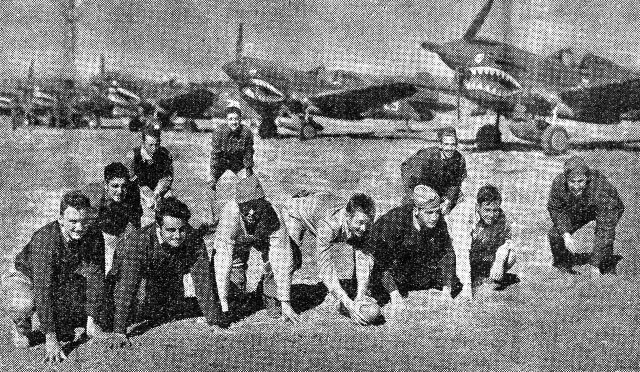 Working on the theory that "all work and no play makes jack a dull boy," members of a fighter squadron in
China take time out between forays against the Jap to play football. The line is made up of, left to
right, Lt. E. H. Warner, L. R. W. Lucia, Lt. C. J. Crysler, Capt. J. K. Hinton, Lt. L. F. Jones, Lt. T. O.
Jeffreys and Lt. W. B. Hawkins. Backfield performers are Lt. A. W. Cruikshank, Lt. D. G. Anderson, Lt. W. A.
Smith and Lt. T. R. Shaprow.
Working on the theory that "all work and no play makes jack a dull boy," members of a fighter squadron in
China take time out between forays against the Jap to play football. The line is made up of, left to
right, Lt. E. H. Warner, L. R. W. Lucia, Lt. C. J. Crysler, Capt. J. K. Hinton, Lt. L. F. Jones, Lt. T. O.
Jeffreys and Lt. W. B. Hawkins. Backfield performers are Lt. A. W. Cruikshank, Lt. D. G. Anderson, Lt. W. A.
Smith and Lt. T. R. Shaprow.
